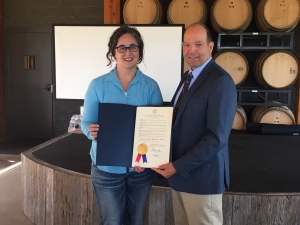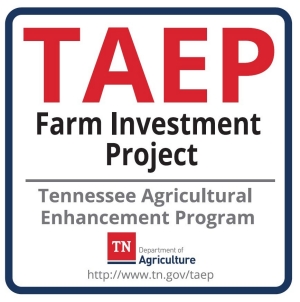

New Markets and New Opportunities
Since Governor Lee took office, we have continued our efforts to provide Tennessee's farmers and forest landowners with new markets and new opportunities. We are focused on supporting our rural, distressed, and at-risk counties, and the Tennessee Department of Agriculture's best way to assist the economy in those areas is by promoting agriculture and forestry. This Rural Routes newsletter will share some of the ways we’re working to do that.
To better align our efforts in providing new markets, we’ve restructured an important part of our department. Our division dedicated to supporting new and expanding agricultural and forestry businesses in our state, now named the Business Development Division, has a renewed focus on international marketing, farm-direct marketing, and industry development.
In an effort to strengthen rural economic development and provide new opportunities, we’ve made a few changes to one of our more popular programs — the Tennessee Agricultural Enhancement Program. Starting this year, TAEP applicants will notice a new cattle herd health program, a new hay equipment program, and other adjustments that we believe will be best for the ever-changing agriculture industry.
Finally, we are continuing to build job creation and economic growth in the areas that need it most through our Agriculture Enterprise Fund. Since 2017, the program has initiated more than $40 million of economic activity, provided nearly $2 million in cost-share assistance to new and expanding businesses, leveraged more than $38 million in investments, and led to the creation of more than 315 Tennessee jobs.
We are excited to share more details about these incredible programs and other significant updates in this Rural Routes newsletter. Thank you for being a part of Tennessee’s number one industry, and please contact us at the Tennessee Department of Agriculture if you have any suggestions for ways we can better serve you.
Sincerely,
Commissioner Charlie Hatcher, D.V.M.

Tennessee Agriculture Commissioner Charlie Hatcher, D.V.M. has announced the appointment of Samantha Beaty, D.V.M. as State Veterinarian and Assistant Commissioner for Animal Health.
With 18 years of veterinary medicine experience, Dr. Beaty will now be responsible for protecting and monitoring animal health throughout the state.
“Dr. Beaty has the knowledge base, work ethic, tenacity, passion for veterinary medicine, and the ability to get the job done,” Commissioner Hatcher said. “She has a strong commitment to serving the public and Tennessee agriculture. She will be a perfect fit in this new role as she partners with animal health leaders and enforces animal health standards.”
Beaty most recently served as the Interim Director for the Tennessee Department of Agriculture’s (TDA) C.E. Kord Animal Health Diagnostic Laboratory. In that role, she led 21 lab staff members in providing timely diagnostic services to Tennessee animal owners and veterinarians.
“Animal agriculture is very important to me,” Dr. Beaty said. “I feel honored to have the opportunity to serve as state veterinarian. I look forward to engaging with Tennessee’s livestock groups and producers to find ways to better serve and protect this important sector of agriculture.”
Beaty joined TDA as a staff veterinarian in 2016. In that role, she implemented and oversaw the department’s livestock welfare program. She assisted with regulatory disease response and was the case manager when high path avian influenza affected Tennessee in 2017. Beaty completed training at the National Veterinary Services Laboratory and is a Foreign Animal Disease Diagnostician.
“I also want to thank Dr. Doug Balthaser for his service as Interim State Veterinarian,” Commissioner Hatcher said. “We appreciate his leadership and his commitment to our animal health team.”
Beaty began her work in veterinary medicine as a high school student in her hometown of Jamestown, Tenn. After graduating from vet school, Dr. Beaty worked in large and mixed animal practice for several years before transitioning to small animal practice.
Prior to joining TDA, Beaty was an associate veterinarian at Premier Vet Care in Smyrna. She has served as a volunteer veterinarian in Botswana with the Maun Animal Welfare Society where she provided preventative care and disease treatment to area animals.
Beaty graduated with a Bachelor of Science degree in Agriculture from Tennessee Tech University in 1998, then completed her degree in veterinary medicine from the University of Tennessee College of Veterinary Medicine.
Dr. Beaty and her husband, Michael Palmer, live on a beef cattle farm in Robertson County with their daughter and enjoy attending minor league baseball games. Beaty’s hobbies include reading and gardening.

The Tennessee Agricultural Enhancement Program (TAEP) is offering new options and changes to better assist Tennessee farmers in diversifying, expanding, and improving their farming operations.
A recent review of the program aligns with Governor Bill Lee’s priority of advancing rural economic development. He supports TAEP and understands the value it brings to communities statewide.
“Agriculture is the foundation for our state’s economy, and our rural areas feel that impact the most,” Gov. Lee said. “TAEP is an investment that reaches far beyond the farming community – it bolsters local businesses, equipment manufacturers, and the countless citizens connected to the ag industry.”
With that focus in mind, TDA conducted a survey of TAEP participants and industry partners to gain feedback about current program offerings and ideas for the future. More than 2,400 people responded, with representation from all 95 counties.
The department also formed an advisory committee of 20 farmers from a variety of agricultural sectors statewide to identify opportunities for program improvements.
“The Ag Enhancement Program touches thousands of farming families all across Tennessee,” Agriculture Commissioner Charlie Hatcher, D.V.M. said. “That’s why we wanted to hear directly from those who know TAEP. We appreciate all who weighed in, and we look forward to seeing the result of these recommendations.”
Guided by survey responses and input from the committee, as well as priorities determined by TDA, TAEP changes for 2019 include:
- A new cattle herd health program aims to improve the health, reputation, and profitability of Tennessee cattle. Participating farmers will implement a preventative herd health protocol for beef and dairy cattle.
- In partnership with the University of Tennessee, the new cattle genetics online tool will assist in determining a bull’s eligibility for TAEP.
- To ensure more long-term investments, the verification period has increased. Applicants must utilize equipment and structures reimbursed with cost share funds for a minimum of five continuous years from the date of purchase.
- The Hay Storage program will not be offered for the 2019-2020 program year in order to launch the new Hay Equipment program. Hay production will be the focus, with hay mowers, mower-conditioners, tedders, rakes, and balers eligible for cost share. Participants must meet minimum requirements of 100 head of cattle, 150 head of goats or sheep, or 100 acres of hay in production.
- The renamed Working Facility Structures program features the Working Facility Cover for existing livestock working equipment and the Permanent Working Pen for receiving, separating, weaning, or holding livestock.
- The Grain Storage program is now called Row Crop Solutions. Cotton has been added as an eligible commodity. New items include drive-over scales, stationary fuel tanks, GPS displays and receivers, grain bin rescue tubes, and no-till drills. The maximum reimbursement has increased to $20,000.
- Application B for Producer Diversification has been simplified and shortened to ease the application process.
- Application C for Poultry Growers will now include ventilation fans and LED lights for retrofitting, as well as feed bins, poultry house trolley systems, and litter management equipment. The maximum reimbursement has increased to $10,000.
- The lifetime reimbursement limits for commodity sheds, grain bins, and livestock working facility covers have been removed.
“This isn’t a one-time review of TAEP,” Commissioner Hatcher added. “TDA will continue to seek input on this popular program to respond to the ever-changing agriculture industry.”
The 2019 TAEP applications are available online.
Established in 2005, TAEP is a cost share program that assists agricultural producers in making long-term investments on Tennessee farms and in rural communities. For every dollar the state awards to an eligible farmer, an estimated $3.89 is generated in the local economy. Since its launch, TAEP has invested more than $168 million in more than 57,000 producer projects, affecting every single county in Tennessee.

We hope you join us in welcoming Kenneth Kim, D.V.M., D.A.C.V.P. as director of the C.E. Kord Animal Health Diagnostic Laboratory (KAHDL).
Dr. Kim will lead the KAHDL in providing accurate and timely diagnostic services to Tennessee veterinarians, animal owners, and commercial animal operations.
“We are very fortunate to have Dr. Kim join our team as the Kord Lab Director,” Agriculture Commissioner Charlie Hatcher, D.V.M. said. “Should any livestock and herd health issues arise, I am confident that Dr. Kim will successfully lead our team to provide a diagnosis and work with Tennessee veterinarians to quickly stop the spread of any disease.”
Kim was the principal of SDx Histopathology and a scientist at the La Jolla Institute for Allergy and Immunology’s Shresta Lab. In addition to his small animal biopsy experience, Dr. Kim leaves the Shresta Lab as one of the world's leading Zika virus research pathologists.
The KAHDL provides diagnostic services for a wide range of animal diseases in many species of animals to serve the needs of the livestock industry and promote animal health within the state. The KAHDL was instrumental in protecting animal health during the 2017 High Pathogenic Avian Influenza outbreak by providing testing, surveillance, necropsies, and early detection of the disease.
Kim received his veterinary degree at the UC Davis School of Veterinary Medicine, and he completed a residency in anatomic pathology at the Louisiana Animal Disease Diagnostic Laboratory in Baton Rouge. Dr. Kim practiced medicine and surgery for 10 years prior to becoming a pathologist and founding SDx Histopathology Inc.
“I am thrilled to be joining the high performing group of laboratory professionals at the Kord lab and to have the support of a business-minded Commissioner,” Dr. Kim said. “My goal at Kord will be to continue building excellent service for Tennessee agricultural producers and veterinarians, and I aim to give Middle Tennessee companion animal veterinarians every reason to keep their valued submissions within the state and contributing to the local economy.”
Dr. Kim and his wife enjoy the great outdoors and have one child. For more information about the Kord Animal Health Diagnostic Laboratory, click here.

The Tennessee Department of Agriculture (TDA) has announced rule changes for Tennessee's hemp program to better serve hemp producers.
“Farmers have been growing and researching this crop in Tennessee since the program began in 2015,” Agriculture Commissioner Charlie Hatcher, D.V.M. said. “The hemp industry and federal laws have changed in recent years, and we’re updating our program rules to be more consistent with how other crop programs are managed.”
The application period for a license to grow hemp is now open year-round. Grower applications can be found here. Licenses will expire June 30 of each year, and all grower licenses issued in 2019 will expire June, 2020.
Other program changes include:
- Hemp processors will no longer be required to register through TDA.
- The hemp program will no longer issue licenses for certified seed breeders. However, anyone manufacturing, distributing, or labeling seed should be licensed through TDA’s Ag Inputs section.
- Growers will still need movement permits when transporting rooted plants and are now required to be permitted when moving harvested hemp from their growing site to a processor for commercial sale.
TDA has licensed more than 3,000 hemp growers in 2019. In 2018, TDA approved 226 hemp producer applications.
Federal and state laws require Tennessee hemp growers be licensed through TDA’s hemp program. While the 2018 Farm Bill removes hemp from the list of federally controlled substances, it remains illegal to grow hemp without a license through an approved state program.
The Tennessee General Assembly enacted Public Chapter 916 in 2014, tasking the department with development of a licensing and inspection program for the production of hemp in Tennessee. You will find more information about Tennessee’s hemp program here.

We now have a new structure for our division dedicated to supporting new and expanding agricultural and forestry businesses.
The renamed Business Development Division prioritizes agricultural economic development by increasing profitability and viability of farm and forest businesses, which are vital to Tennessee’s rural and overall economy.
“Governor Lee and I are both dedicated to supporting Tennessee’s agribusinesses, which in turn strengthens our rural economies,” Agriculture Commissioner Charlie Hatcher D.V.M. said. “With this renewed focus on business development, we will work to expand opportunities for agricultural innovation, technology, and entrepreneurship — areas that are crucial to any state’s future success in the agriculture industry.”
Keith Harrison now leads the division as Assistant Commissioner. Harrison began his career at the Tennessee Department of Agriculture as an Agricultural Marketing Specialist in 1984 and served as Director of Marketing until the end of 2000. In 2001, he was named the Feed/Animal Health Marketing Manager at Tennessee Farmers Cooperative and served as the organization's Communication and Marketing Manager until early 2017. Harrison then served as TDA’s Assistant Commissioner for Consumer and Industry Services, leading the regulatory programs affecting consumer protection and food safety until early 2019, when he shifted to leadership of the Business Development Division.
Focus areas include international marketing, farm-direct marketing, and industry development. The division will also look to strengthen Tennessee’s agriculture industry through cost-share programs, such as the Agriculture Enterprise Fund and Specialty Crop Block Grants. The division will provide strategic direction and outreach for the Tennessee Agricultural Enhancement Program.
A renewed emphasis has been established for export promotion and international marketing through the Southern United States Trade Association (SUSTA). SUSTA, in partnership with the USDA’s Foreign Agriculture Service, shares the costs of overseas marketing and promotional activities with small businesses that help build commercial export markets for U.S. agricultural products. In April, TDA hosted an inbound trade mission where buying agents from Canada were introduced to Tennessee beer, wine, and spirits producers. The division participated in the American Food Fair in Chicago and the Summer Fancy Food Show in New York this year, connecting Tennessee food manufacturers with international buyers. Other countries of focus include Mexico, Argentina, Vietnam, India, and China.
The division also has a new Food Products Business Consultant. Mike Brown has been with the Tennessee Department of Agriculture since 2014, originally serving as outreach coordinator in the Consumer and Industry Services Division. As a business consultant, he works with new and expanding food manufacturers to develop marketing opportunities. Brown has 36 years of experience in the food industry, and prior to joining the department, he worked as a food marketing and product development consultant.
Staff members in the Business Development Division will work to increase agricultural commodity processing and production capacity in the state to accommodate the growing demand and opportunity for direct and retail sales through incentives for upgrading and expanding facilities. They will also work toward the creation of an open market for state food service systems to increase the purchase of fresh, Tennessee-produced products by school systems, hospitals, correction facilities, and other Tennessee organizations with a dual purpose of increasing nutritional offerings and farm income.
The Tennessee Department of Agriculture’s mission is to promote wise use of our agricultural and forest resources, develop economic opportunities, and ensure safe and dependable food and fiber for the citizens of Tennessee. For more information about TDA’s Business Development Division, click here.
TDA and the Tennessee Department of Economic and Community Development (TNECD) have partnered with local agribusinesses to initiate more than $40 million of economic activity through the Agriculture Enterprise Fund (AEF).
The AEF is an incentive program that supports job creation and economic growth by facilitating agricultural development in Tennessee. The program has provided nearly $2 million in cost-share assistance to new and expanding Tennessee agriculture, forestry, and food businesses, which has leveraged more than $38 million in investments.
“This program has directly led to the creation of more than 315 Tennessee jobs, and we’re going to continue that job growth in the areas that need it most,” Tennessee Governor Bill Lee said. “These strategic agribusiness investments are contributing to much more than the program recipients’ growth. They are providing pivotal opportunities for the local businesses, economies, and communities.”
In June, Governor Lee, along with TDA Commissioner Charlie Hatcher, D.V.M. and TNECD Commissioner Bob Rolfe, announced the seventh round of AEF grant recipients who will now have the opportunity to grow and positively impact rural economies.
“Since the AEF program started in 2017, it has provided funding assistance for nearly 50 projects throughout Tennessee,” Commissioner Hatcher said. “With plans to further streamline the application processes, we will continue utilizing this program as an effective way to strengthen Tennessee’s agriculture and forestry businesses.”
Successful grant recipients must demonstrate a strong potential for impact on local farm income, access to markets, increased capacity, or agricultural innovation. Priority is given to businesses located in at-risk or distressed counties.
“Tennessee puts a major emphasis on promoting growth in our rural communities,” Commissioner Rolfe said. “With programs like the Agriculture Enterprise Fund, we are continuing this growth by making sure our rural counties across the state are better equipped for economic and agricultural development. I look forward to seeing the accomplishments that will come from these recipients and wish them future success.”
The most recent AEF grant recipients and projects include:
- Baldwin Lumber, Fentress County – sawmill adding a wood chipper
- Cades Cove Cellars, Blount County – winery purchasing additional local fruit
- HKH Industries, Scott County – startup hemp processing facility
- Hughes Farms, Bledsoe County – adding cooler space to store produce
- Stony Creek Colors, Robertson County – increasing contracts for indigo farmers
- Tennessee Mills, Overton County – sawmill expanding to produce more pallets
- Todd Contracting, Van Buren County – sawmill expanding production of kiln-dried firewood
“We are truly honored to be selected as one of the recipients of the Agricultural Enterprise Fund for 2019,” Mark Case of HKH Industries said. “Our grant will be used to purchase specialized equipment to help Tennessee hemp farmers get their harvest to market, while also adding jobs in our local community. Thank you to Governor Lee, Commissioner Hatcher, and the teams at TDA and TNECD for working so hard to fill the need for farmer and community assistance in our area.”
You will find more information about the Tennessee Agriculture Enterprise Fund at www.tn.gov/agriculture.
The USDA Forest Service and the Tennessee Department of Agriculture Division of Forestry (TDF) have entered into a Good Neighbor Authority (GNA) master agreement to help conserve, protect, and manage natural resources in the Cherokee National Forest.
At an annual interagency meeting in April, Tennessee State Forester David Arnold and Cherokee National Forest Supervisor JaSal Morris signed the agreement. The intent of the GNA is to allow TDF to perform work on national forest lands on behalf of the Forest Service. Among other things, the agreement provides the ability to work across jurisdictional boundaries and implement management practices in a mixed federal/state ownership setting. It also fosters a collaborative approach in addressing land management challenges and provides the ability to leverage state resources to accomplish work on National Forest System lands. The GNA was made possible by The Agricultural Act of 2014 (Farm Bill), which authorizes the Secretary of Agriculture and the Secretary of Interior to enter into agreements with states to carry out authorized restoration services.
“Sometimes federal and state agencies have different constraints, requirements, and guiding documents," Tennessee State Forester David Arnold said. "But when it comes to on-the-ground management of our forests, federal and state agencies can work together in the land’s best interest.”
The agreement a five year Master Agreement and there are no specific projects or work identified at this time. However, this document lays the framework for supplemental project agreements that can be signed later when funding and projects are identified. Examples of projects that might be done through GNA supplemental agreements include watershed restoration and protection, forest health thinning, prescribed fire, forest planning, wildlife management and timber harvesting preparation. In exchange, TDF can receive reimbursement for the work and receive added benefits of on-the-job skills training and experience for employees.
“Taking care of America’s lands and natural resources is a big job," Cherokee National Forest Supervisor JaSal Morris said. "No single organization can do it alone. The Good Neighbor master agreement really frames up what the agencies agree to do and puts us in a great position to capitalize and make the most of the natural resources that we manage together for the benefit of users.”
Cherokee National Forest, covering over 650,000 acres, is located in ten east Tennessee counties along the North Carolina border. It is the largest single tract of public land in the state.
Tennessee horse owners now have a new resource to protect the health of their livestock. GlobalVetLink is offering the Extended Equine Certificate of Veterinary Inspection (EECVI), which provides real-time tracking and better disease traceability for horses being transported across state lines.
“As we work to keep Tennessee horses safe and healthy, it is important that we are aware of the equines entering and exiting our state,” Interim State Veterinarian Doug Balthaser, D.V.M. said. “The EECVI will be available to owners 24 hours a day and will be accepted in more states than our current permit. Additionally, if the worst happens and there is a disease outbreak, real-time tracking will enable state animal health officials to notify horse owners much more quickly.”
In order to transport a horse, mule, donkey, pony, zebra, or other equine across state lines, a certificate of veterinary inspection (CVI) and negative test for Equine Infectious Anemia (EIA) is required. The CVI shows that a veterinarian has inspected each equine for signs of disease to ensure that it appears healthy for movement.
The EECVI extends the CVI date of expiration from 30 days to 6 months, and it eases travel to multiple states with different requirements. The EECVI offers travel itineraries in a digital format that horse owners complete and upload to the online system prior to the time of transport.
TDA partnered with other states more than a decade ago to provide the previous movement permit offered, the Tennessee Equine Interstate Event Permit (Equine Passport). However, all of the original partner states have decided to stop using the Equine Passport program and to transition to EECVI.
For more information about the Extended Equine Certificate of Veterinary Inspection, contact the State Veterinarian’s office at (615) 837-5120 or click here.